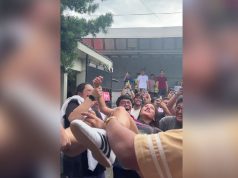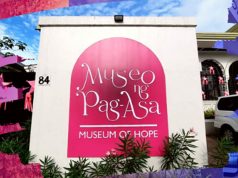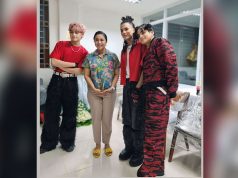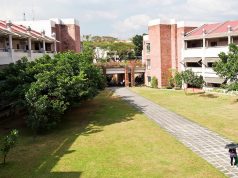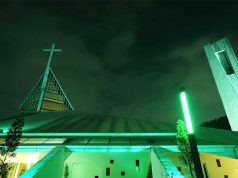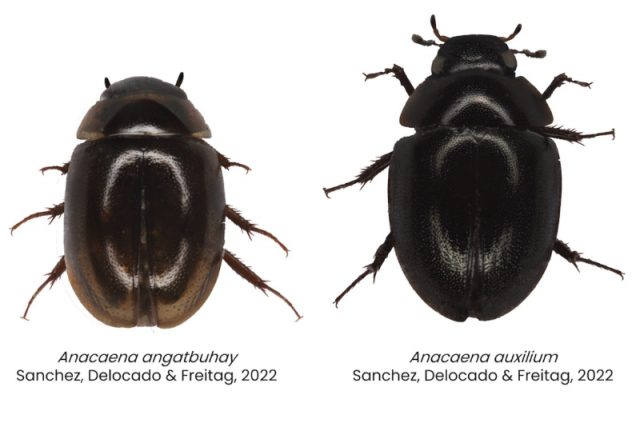
One of the newly discovered beetle species was named to honor an organization with unparalleled service to the public.
This was stated by the Filipino scientists who discovered two new species of beetles in the Philippines. One of them was named after the Angat Buhay program that veteran lawyer Leni Robredo launched during her vice presidency.
The scientific names of the two beetles are Anacaena angatbuhay and Anacaena auxilium.
They were discovered and described by Enrico Gerard Sanchez (BS Biology 22), thesis adviser Emmanuel Delocado, and co-adviser Hendrik Freitag from the Ateneo Biodiversity Research Laboratory of the Department of Biology.
Their findings were part of Sanchez’s undergraduate thesis that he had successfully accomplished last April amid the still raging COVID-19 pandemic.
This scientific breakthrough was promoted on the social media accounts of Ateneo de Manila University on July 14.
Two new species of water scavenger beetles were discovered and described by Enrico Gerard Sanchez (BS Biology 22), thesis adviser Dr Emmanuel Delocado, and co-adviser Prof Dr Hendrik Freitag from the Department of Biology.
Read more: https://t.co/AIO6Xp52Yg pic.twitter.com/wmkQd45Zyw
— Ateneo de Manila University (@ateneodemanilau) July 14, 2022
In a Facebook post, Delocado explained the reason behind Anacaena angatbuhay’s name.
“We are naming the new species after the Angat Buhay program in honor of its valuable and unparalleled service especially in the time of pandemic,” he said.
The author further juxtaposed the beetle’s “humble” habitat in Ifugao with the Filipino volunteers who work with far-flung communities behind the scenes.
“Moreover, as the species has been thriving unnoticed in a humble mountain creek in Ifugao for at least the last few centuries, dedicating a species name to the Angat Buhay program is a nod to the countless Filipinos silently and persistently working alongside far-flung communities despite the lack of due recognition,” Delocado said.
Angat Buhay gained prominence during the height of the pandemic in March 2020 when it stepped up to provide stellar initiatives to Filipinos, particularly health workers and other COVID-19 frontliners.
RELATED: Robredo’s supporters clap back at Roque with list of OVP’s COVID-19 initiatives
Among the notable initiatives that benefited thousands of Filipinos back then are the Swab Cab, which offered free COVID-19 tests; the Bayanihan E-Konsulta, which provided free telemedicine services and COVID care kits; and free shuttle services and dorms to healthcare workers.
RELATED: Volunteers air messages as OVP’s Bayahinan E-Konsulta announces pending termination
Angat Pinas Inc., the registered name of Angat Buhay as a non-government organization, expressed its gratitude to the authors for this recognition.
Maraming salamat, Enrico Gerard Sanchez, Dr Emmanuel Delocado at Prof Dr Hendrik Freitag mula sa Ateneo Biodiversity Research Laboratory ng Department of Biology ng Ateneo de Manila University! https://t.co/NKEv5wdH0w
— Angat Buhay (@angatbuhay_ph) July 14, 2022
The Anacaena auxilium beetle
The other beetle, meanwhile, was named in honor of the Mary Help of Christian High School Seminary in Binmaley, Pangasinan.
Sanchez was an alumni of this high school.
“The species is dedicated to the seminary as a way of appreciation for the home where Gero spent his formative years. This looking back to the roots is fitting as this paper is published two months before his college graduation ceremony,” he said.
The entire thesis can be accessed via this link: Two new species of Anacaena Thomson, 1859 (Coleoptera, Hydrophilidae) from Northern Luzon, Philippines (pensoft.net).
Achieved through a lab-at-home setup
Aside from the meaningful names, Ateneo stated that the study was noteworthy because it was conducted through an innovative lab-at-home setup amid the pandemic.
The university explained that the home lab microscopes used were acquired with the support of the SC Johnson Environmental Leadership Development Fund.
“Sanchez performed sorting and dissection at home, with several virtual walkthroughs and Zoom consultations with Delocado and Freitag,” it said in a statement.
“In addition, courier services were utilized to transport samples and materials among the authors,” it added.
When the restrictions were slowly being lifted, and the campus reopened, the authors were able to perform “specimen observation and photo documentation using suitable equipment.”




